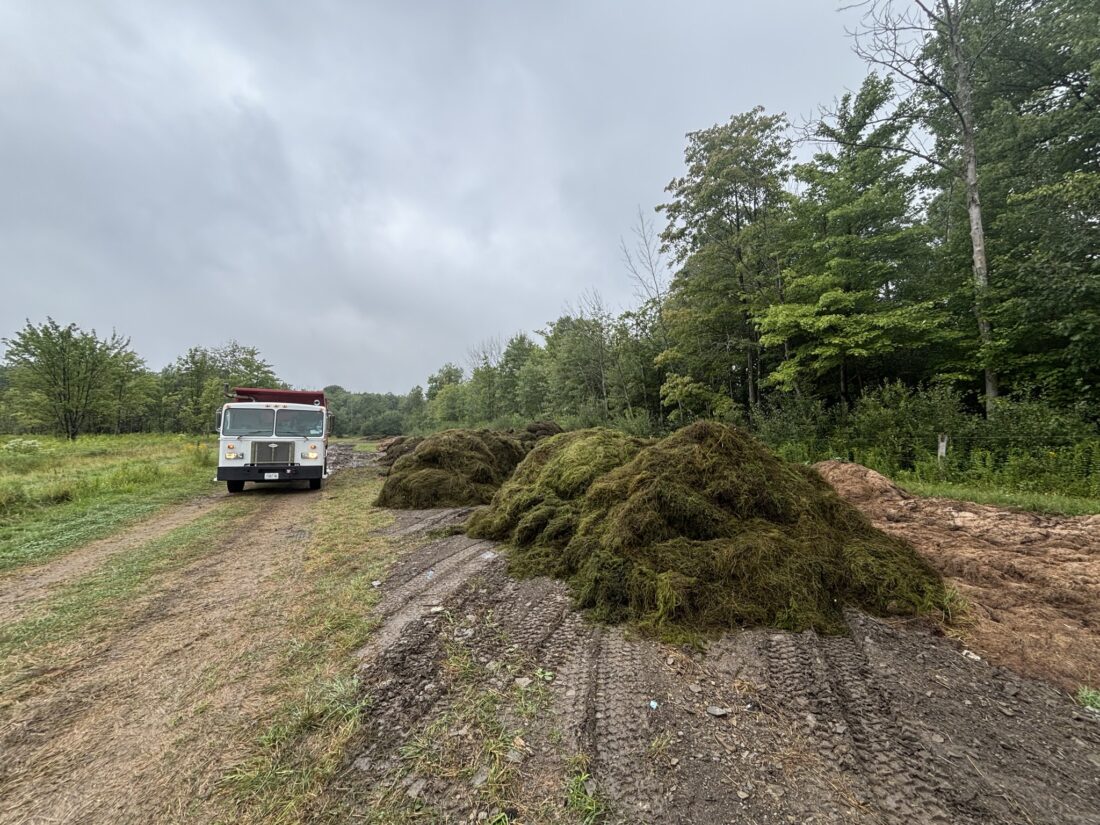Chiming In On Lawsuit
Lakewood, Bemus Point Businesses File Affidavits In Lake Lawsuit

Chautauqua Lake Association crews have removed more than 19 million pounds of weeds from Chautauqua Lake this summer. Lakewood officials said in an affidavit that new Freshwater Wetlands Act regulations have made conditions poor in the lake’s south basin this summer despite CLA and Chautauqua Lake Partnership efforts to manage invasive weeds in the lake. Photo courtesy Chautauqua Lake Association
Lakewood and Bemus Point officials are asking the state Supreme Court to take their views of the state’s Freshwater Wetlands Regulations into consideration when deciding four lawsuits, including two filed by local groups.
The Bemus Point Business Association and the village of Lakewood have filed notices of motion for leave to file affidavits in the lawsuits brought by the Chautauqua Lake Property Owners Association and Chautauqua Lake Partnership seeking to annul the state’s Freshwater Wetlands Act changes that took effect earlier this year. The organizations filed notice recently, though arguments to make the case why the affidavits should be allowed aren’t expected to take place until Sept. 5.
The Lakewood Village Board is asking for permission to have its opinion known on both lawsuits.Randall Holcomb, Lakewood mayor, said in an affidavit to the court that the Lakewood Village Board supports the annulment of the Freshwater Wetlands Act changes because enforcing the amendments poses threats to lake communities through unclear regulatory definitions, burdensome permitting and economic impacts that Holcomb said will hurt the village’s ability to maintain public land, support seasonal businesses and protect seasonal access to the lake. A copy of the affidavit received by The Post-Journal, but not yet posted because the judge hasn’t decided whether it will be part of the public record, says the village board is also asking for a moratorium on enforcement of the wetlands act changes until the DEC publishes complete wetlands maps, formal public comment is collected, retroactive impact studies are conducted for affected lakes, including Chautauqua Lake; definitions and buffer zones are refined based on hydrological and ecological evidence and a full scientific explanation of the advantages and reasons to turn a lake with weeds into a wetlands is done. The village also asks for collaborative rulemaking that involves municipalities, scientists and regional planning bodies, asks the state to protect seasonal economies and local planning authority by ensuring expedited and clearly defined permitting processes and declare the current regulatory framework inequitable, lacking proportionality, clarity, and benefit to affected lake communities.
“Our village has previously partnered with local stakeholders to support invasive species control, shoreline stabilization and water quality monitoring,” Holcomb said in an affidavit supporting the village’s amicus curie affidavit filed Aug. 14. “Under the current regulatory framework, access to herbicide permitting and maintenance activities is increasingly delayed or denied. For some of these same reasons, the south basin’s lake shoreline conditions have made the lake mostly unusable for the past four weeks.”
Andrew Carlson, Bemus Point Business Association president, makes a similar case for allowing the association’s brief to be entered into the record. Carlson said in his affidavit that changes to the Freshwater Wetlands Act ignore the fact Chautauqua Lake has a largely developed lakefront with infrastructure and businesses that have been in existence for decades. Designating more of the lake as Class 1 regulated wetlands, Carlson wrote, has impacted this year’s invasive aquatic species management – including herbicides and manual weed removal.
“If the above treatments are delayed or denied due to regulatory uncertainty, the lake becomes less usable,” Carlson wrote. “Weed overgrowth can limit boat traffic, discourage swimming and reduce overall visitor satisfaction. Lakefront businesses must also deal with the stench caused by decaying weeds, which drives away customers and can drastically impact business. In short, if the lake cannot be used as intended during the summer season, the entire structure of Bemus Point’s economy is placed at risk.”
Carlson argued that the state’s economic impact studies failed to consider the impact on small, rural lakefront communities like Bemus Point. Carlson and Marilyn Fiore-Lehman, the attorney representing the association, said uncertainty from the wetlands regulations could delay or cause the cancellation of regularly scheduled events that will hurt village businesses.
“As previously provided, most businesses in Bemus Point operate on extremely tight seasonal timelines,” Carlson wrote. “A delay of even a few weeks can result in missed income that cannot be recovered. In some cases, businesses may need to choose to cancel or delay planned upgrades or repairs altogether, not due to environmental concerns but because the permitting process has become too unpredictable or too expensive to pursue. These regulations negatively impact out-of-town owners of lakefront homes or part-time residents who are key contributors to the local economy. If property owners are discouraged from investing in their homes or prevented from purchasing old cottages and rebuilding, the ripple effect impacts local contractors, landscapers, retail shops and service businesses.”
The Chautauqua Lake Property Owners Association, town of Ellery, Bemus Point Business Association and Builders Association of the Southern Tier are asking the state Supreme Court to annul, vacate and set aside the 2022 amendments to the state’s Freshwater Wetlands Act that took effect Jan. 1, 2025. The local organizations are represented by William A. Hurst of Young Sommer in Troy. The lawsuit argues the Freshwater Wetlands Act changes violate the State Administrative Procedure Act, violate state and federal due process protections in the state and U.S. constitutions, that the amendments are arbitrary, capricious and irrational; that the DEC’s newly created jurisdictional determination process constitutes an improper delegation of authority; and that the Freshwater Wetlands Act changes violate the state’s Municipal Home Rule Law by taking authority designated to local governments.
Chautauqua Lake Partnership officials say it is arbitrary and capricious to designate lakes as freshwater wetlands, that the Freshwater Wetlands Act’s incorporation of “wetlands of unusual importance” is arbitrary and capricious and should be void because it is too vague and alleges the DEC didn’t follow the state’s own Environmental Quality Review Act and the State Administrative Procedures Act. CLP officials also say two of the 11 deciding factors in declaring a wetlands in the Freshwater Wetlands Act delegate too much authority to the state DEC without proper safeguards. Much like the CLPOA lawsuit, the CLP officials raise concerns about the 100 foot buffer zone for in-lake areas that have been declared a wetland.




